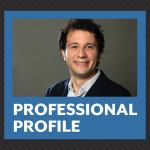Postdoctoral Researcher, Galter Health Sciences Library, Northwestern University
 |
|
Please tell us a bit about yourself (e.g. hometown, current locale, course of study).
Born in Tehran, Iran, I acquired a B.A. in Business Management and an M.A. in Applied Ethics in the Netherlands (2009-2016). Fascinated by the ethics of scholarly authorship and publication issues, I completed a PhD in Research Ethics and Integrity in Ireland (2017-2021). I am currently a postdoctoral researcher at Galter Health Sciences Library at Northwestern University in Chicago and an assistant editor in the journal of Accountability in Research (Taylor & Francis).
Describe your current responsibilities and what type of organization you belong to.
My research focuses on publication ethics and the distribution of credit and responsibilities in collaborative research. My other research interests include citation ethics, gender issues in academia, and ethics of using technology in scholarly research. With this work I strive to cultivate fair and inclusive working cultures and improve the ethics and integrity of research.
What was your first scholarly publishing role? How did you get that job? What path led to your current position?
Upon commencing the M.A. program in Applied Ethics (2015), and after having completed the course ‘Science and integrity’, I noticed that research integrity and the ethical aspect of scholarly authorship are what I am most fascinated about. During this one-year program, I used every opportunity to keep myself involved in projects about research integrity and scholarly authorship and by the end of the program had published one paper in a peer-reviewed journal and was working on my second paper. In 2017, I started a PhD program and joined the EnTIRE project (a European project that developed a disciplinary repository for research ethics and integrity, entitled, ‘The Embassy of Good Science’ https://embassy.science/). During this period I worked on several research projects that explored the ethics and integrity of research, and the attribution of credit and responsibilities in academia. In 2021 and upon defending my PhD thesis entitled ‘The ethics of contributor role ontologies and taxonomies’, a postdoc opportunity came up in Chicago, which offered me the chance to continue my research and explore new ethical issues in scholarly publications.
If there was a pivotal moment or key person in your career development, please describe briefly.
Surviving in academia while having to put up with obstacles of being a foreigner is perhaps a key achievement. I managed to do both with perseverance and with the help of academic mentors and friends. I think that the notion of ‘it takes a village to raise a child’ is quite literally present in academia: many of my mentors and colleagues have played a role in forming my professional personality. Some of my best colleagues and advisors have been experienced figures in the field of scholarly communications, who have generously and kindly helped me to survive and grow in this domain. So being among good colleagues, my role has been quite simple: persevere and grow.
What are some of the surprises/obstacles that you’ve encountered during your career?
I was expecting more diversity in the field because most of the posts and communication on social media seem to imply that the field is quite diverse. When I attended my first SSP conference in 2022 in Chicago, my impression was that the field mostly consists of white colleagues from the anglophone world, especially in more senior positions. Of course, this might be because many colleagues were unable to travel to Chicago but either way I was surprised.
What advice would you give to people interested in a career in scholarly communications?
Be mobile and dare to leave your comfort zone if you want to grow in this field. I have put myself through three immigrations (from Iran to the Netherlands, from the Netherlands to Ireland, and from Ireland to the US) to continue my education and fulfill my professional ambitions in this field. Furthermore, I have realized that scholarly communication norms vary significantly from place to place and it is only by becoming a part of different communities that one gets to sense nuances and grasp their differences.

